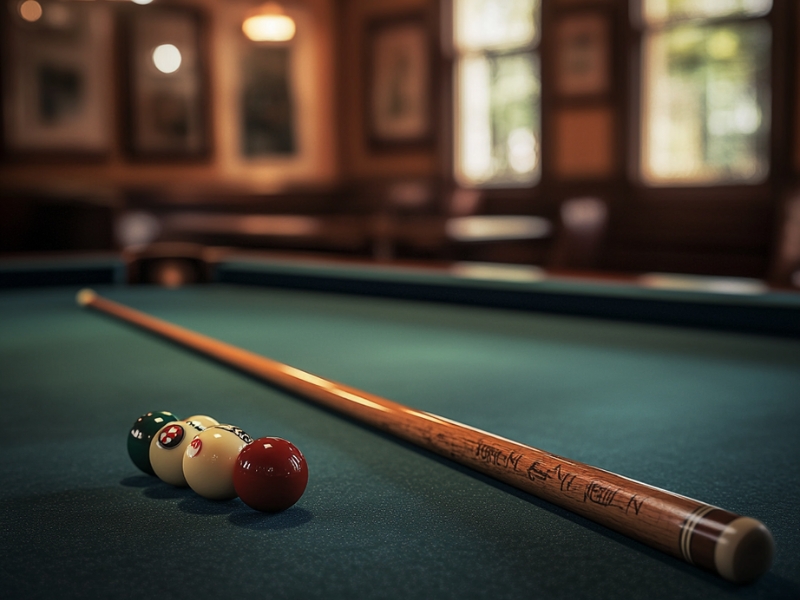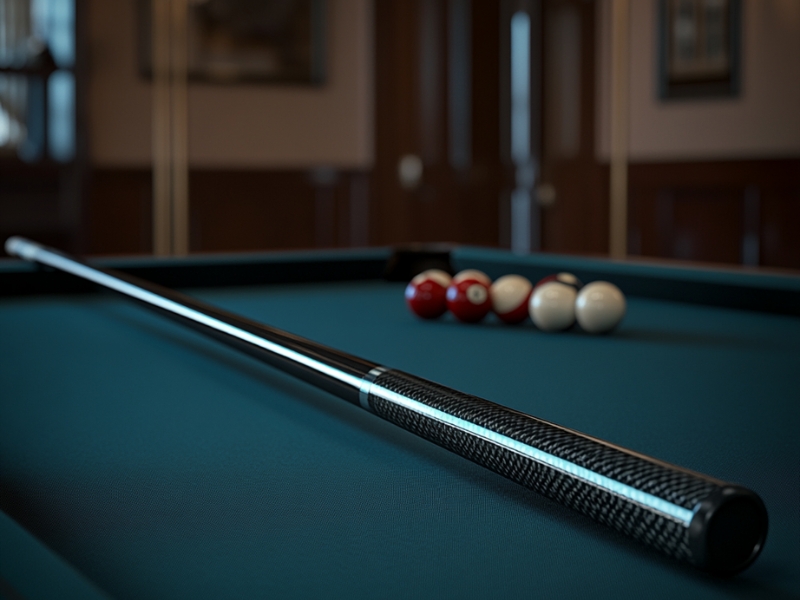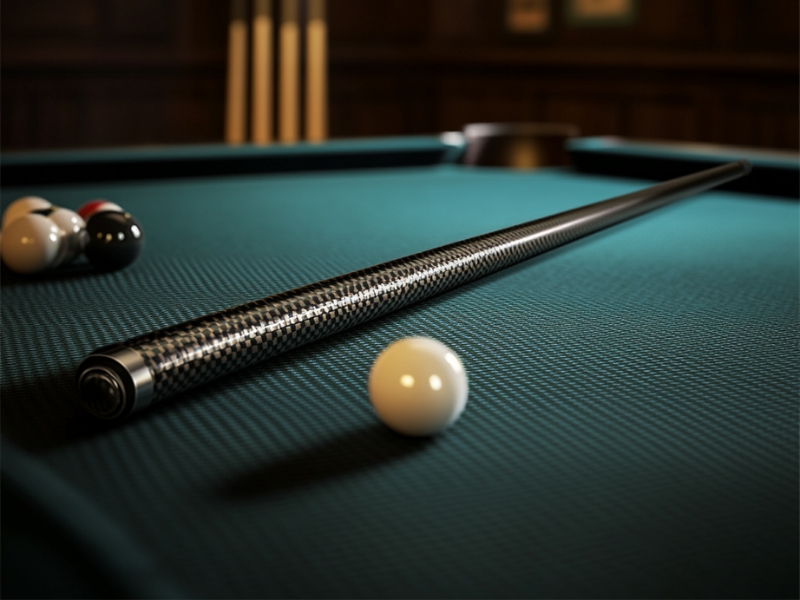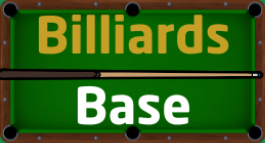The right pool cue will give you better accuracy, control, and overall gameplay. Choosing the correct pool cue is therefore crucial. No matter what level you are, if your pool cue isn’t suited to you, your results will suffer.
Knowing about different cue materials, sizes, and tips for buying will help you make an informed decision!
Why Choosing the Right Pool Cue Matters
Pool cues play an important role in performance. Pool cues impact accuracy, spin, and shot power. If you’re using a poor-quality or cue mismatched for your style, it will hinder progress, especially if you’re a beginner.
Key Factors to Consider When Buying a Pool Cue

1. Material
The material of your cue can play a big part in your performance. Wood shafts offer a classic, traditional feel, but the onus will be on you to regularly maintain your cue.
Carbon fiber cues are lightweight, durable, and consistent, with minimal upkeep required. However, they can feel quite different to a wooden cue, which some players dislike.
Fiberglass and other composite materials can be used for cues as an affordable, low-maintenance alternative, but they’re not recommended.
On the butt of your cue you’ll want decorative woods, synthetic overlays, or rubberized grips for comfort.
2. Length
The length of your cue will differ depending on your height and playstyle. The standard cue length of 57-58 inches is suitable for most adults between 5’4 and 6’2. Shorter cues of 36-48 inches are ideal for kids or players playing in tight spaces. Longer cues are 60 inches and above, designed for taller players or those with longer arms.
3. Weight
Pool cues typically range between 18-21 ounces in weight. Lighter cues between 18-19 ounces can be better for finesse and spin control, while heavier cues between 20-21 ounces are great for powerful shots and breaking.
You Might Like: How to Maintain Your Pool Cue
4. Tip Type
Consider the type of cue tip you want:
- Soft tips: Enhance spin but wear down faster.
- Medium tips: Balanced option for spin and durability.
- Hard tips: Last longer but offer less spin.
5. Balance
The balance point of the cue will affect how it feels during play. You’ll have to test a few different cues to find a balance point that feels natural.
Types of Pool Cues and Their Uses
There are multiple types of pool cues with different uses:
- Standard cues: Great for casual and beginner players and usually come in a one-piece or two-piece design.
- Break cues: Designed with heavier construction for maximum power during breaks, and reinforced tips to withstand high-impact shots.
- Jump cues: Shorter and lighter for precise jump shots, often used in combination with break cues.
- Specialty cues: Custom cues tailored to specific play styles or game formats ie snooker.
How to Test a Pool Cue Before Buying

1. Check the Feel
Hold the cue and test its weight and balance. Check the feel of the cue, ensuring it feels comfortable and suits your grip.
2. Roll Test for Straightness
Lay the cue on a flat surface and roll it. If your cue is straight it will roll smoothly without wobbling. If there’s any wobbles, the cue has an issue.
You Might Like: Pool Cue Buying Guide
3. Practice Shots
Test the cue by taking a few practice shots with it, if you’re in a physical store. This will allow you to assess its accuracy, spin control, and overall performance before committing to the purchase.
Best Pool Cue Brands to Consider
1. Predator
- Features:
- Known for advanced technology and premium materials.
- Offers carbon fiber shafts and precision-engineered designs.
- Best For: Intermediate to professional players.
2. McDermott
- Features:
- High-quality craftsmanship with lifetime warranties.
- Wide range of options for all skill levels.
- Best For: Players seeking durability and reliability.
3. Players
- Features:
- Affordable cues with excellent build quality.
- Offers cues tailored to beginners and casual players.
- Best For: Budget-conscious players.
Pool Cue Buying Tips for Beginners

1. Start with a Budget-Friendly Option
If you’re on a budget, then look for a cue within the $50-150 range. Here, you want to focus on durability and comfort over aesthetics. A cue you don’t like the look of may just be the best deal around for your budget! Consider performance over design.
2. Look for Versatility
If you’re looking for a versatile cue, opt for medium-weight (19-20 ounces) for balanced play. You can also opt for a medium tip to accommodate for different shot types ie backspin, sidespin etc.
3. Avoid Overcomplicating the Process
Don’t overcomplicate it! Stick to standard cues until you develop a consistent playing style, then upgrade your cue as your skills improve.
You Might Like: Best Pool Cue Cases in 2024
Advanced Tips for Professionals
1. Upgrade to Custom Cues
A custom cue that’s tailored will offer weight, balance, and design personalized for you. This is ideal if you find yourself with preferences or needs in your game to take you to that next level.
2. Invest in Carbon Fiber
If you have the budget, investing in a carbon fiber cue is a no brainer! As a high performance material, they boast a ton of longevity and minimal upkeep. Carbon fiber cues are well worth the investment if you play competitively and/or frequently.
3. Maintain a Set of Cues
As there are different cues for different types of situations, you should probably maintain a set of cues. One for breaks, one for jumps, and one for playing at a minimum. You can protect your cues with quality cases to extend their lifespan.
Buying the Best Pool Cue
Buying the best pool cue for you will make a remarkable difference in your gameplay. With so many options available, it can be a little overwhelming to pick.
Try to enjoy the process of finding your cue and treat it as a long-term investment that will play off in your performance!
FAQs About Buying a Pool Cue
What is the best weight for a pool cue?
- A 19–20 oz cue is ideal for most players, offering a balance of power and control.
How much should I spend on my first cue?
- Beginners should budget $50–$150 for a durable, beginner-friendly cue.
What’s the difference between one-piece and two-piece cues?
- One-piece cues are common in pool halls and less portable, while two-piece cues are more convenient for travel and customization.
